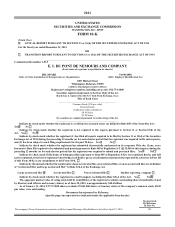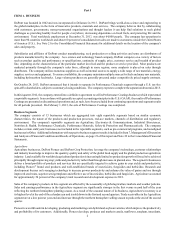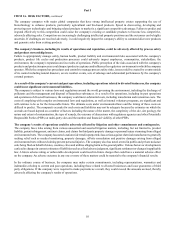DuPont 2013 Annual Report Download - page 4
Download and view the complete annual report
Please find page 4 of the 2013 DuPont annual report below. You can navigate through the pages in the report by either clicking on the pages listed below, or by using the keyword search tool below to find specific information within the annual report.
Part I
ITEM 1. BUSINESS, continued
3
wheat and rice. As the world's population grows and the middle class expands, the need for crops for animal feed, food, biofuels
and industrial uses continues to increase. The business competes with other seed and plant biotechnology companies. Pioneer
seed sales amounted to 23 percent, 21 percent and 19 percent of the company's total consolidated net sales for the years ended
December 31, 2013, 2012 and 2011, respectively.
Pioneer's research and development focuses on integrating high yielding germplasm with value added proprietary and/or licensed
native and biotechnology traits with local environment and service expertise. Pioneer uniquely develops integrated products for
specific regional application based on local product advancement and testing of the product concepts. Research and development
in this arena requires long-term commitment of resources, extensive regulatory efforts and collaborations, partnerships and business
arrangements to successfully bring products to market. To protect its investment, the business employs the use of patents covering
germplasm and native and biotechnology traits in accordance with country laws. Pioneer holds multiple long-term biotechnology
trait licenses from third parties as a normal course of business. The biotechnology traits licensed by Pioneer from third parties are
contained in a variety of Pioneer crops, including corn hybrids and soybean varieties. The majority of Pioneer’s corn hybrids and
soybean varieties sold to customers contain biotechnology traits licensed from third parties under these long term licenses.
Pioneer is actively pursuing the development of innovations for corn hybrid, soybean varieties, canola, sunflower, wheat and rice
based on market assessments of the most valuable opportunities. In corn hybrids, programs include innovations for drought and
nitrogen efficiency, insect protection and herbicide tolerance. In soybean varieties, programs include products with high oleic
content, multiple herbicide tolerance and insect protection.
Pioneer has seed production facilities located throughout the world. Seed production is performed directly by the business or
contracted with independent growers and conditioners. Pioneer's ability to produce seeds primarily depends upon weather conditions
and availability of reliable contract growers.
Pioneer markets and sells seed product primarily under the Pioneer® brand but also sells and distributes products utilizing additional
brand names. Pioneer promotes its products through multiple marketing channels around the world. In the corn and soybean
markets of the U.S. Corn Belt, Pioneer® brand products are sold primarily through a specialized force of independent sales
representatives. Outside of North America, Pioneer's products are marketed through a network of subsidiaries, joint ventures and
independent producer-distributors.
DuPont Crop Protection serves the global production agriculture industry with crop protection products for field crops such as
wheat, corn, soybean and rice; specialty crops such as fruit, nut, vine and vegetables; and non-crop segments, including forestry
and land management. Principle crop protection products are weed control, disease control and insect control offerings. Crop
Protection products are marketed and sold to growers and other end users through a network of wholesale distributors and crop
input retailers. The sales growth of the business' insect control portfolio is led by DuPontTM Rynaxypyr® insecticide, a product that
is used across a broad range of core agricultural crops.
The major commodities, raw materials and supplies for the Agriculture segment include: benzene derivatives, other aromatics and
carbamic acid related intermediates, copper, corn and soybean seeds, insect control products, natural gas and seed treatments.
Agriculture segment sales outside the U.S. accounted for 54 percent of the segment's total sales in 2013.
Electronics & Communications
Electronics & Communications (E&C) is a leading supplier of differentiated materials and systems for photovoltaics (PV),
consumer electronics, displays and advanced printing that enable superior performance and lower total cost of ownership for
customers. The segment leverages the company's strong materials and technology base to target attractive growth opportunities
in PV materials, circuit and semiconductor fabrication and packaging materials, display materials, packaging graphics, and ink-
jet printing. In the growing PV market, E&C continues to be an industry-leading innovator and supplier of metallization pastes
and backsheet materials that improve the efficiency and lifetime of solar cells and solar modules. Solar modules, which are made
up of solar cells and other materials, are installed to generate power. DuPont is a leading global supplier of materials to the PV
industry.
In the displays market, E&C has developed solution-process technology, which it licenses, and a growing range of materials for
active matrix organic light emitting diode (AMOLED) television displays. The segment has a portfolio of materials for
semiconductor fabrication and packaging, as well as innovative materials for circuit applications, to address critical needs of
electronic component and device manufacturers. In consumer electronics, E&C materials add value in the high growth hand-held

















